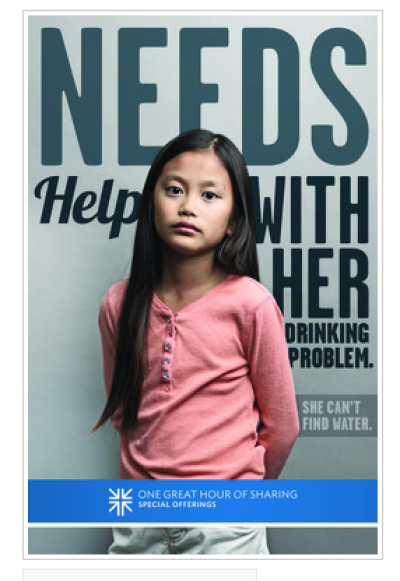PC(USA) revamps offering campaign that racially offends, trivializes addiction

LOUISVILLE, KY. (Christian Examiner) -- Getting high and drinking problems were highlighted, sort of, in a recent Presbyterian Church (USA) special offering campaign intended to move church members to give and get involved. Instead the provocative marketing materials evoked controversy for being racially and culturally insensitive.
One of the promotional pieces included word plays that read "Needs help getting high" in large print and "above the flood waters" in smaller letters. Another featured the image of a young Asian girl that stated "Needs help with her drinking problem" in a big bold font and "she can't find water" in shrinking text.
According to the denomination's initial announcement about the One Great Hour of Sharing offering campaign, Sam Locke, director of special offerings said the "powerful message" was intended to draw attention to the faith's first of four annual offerings which collect donations to relieve hunger, respond to natural disasters and redress social and economic injustice. Historically, the offering campaigns engage participation of only about half of PC(USA) congregants.
The images, "highlight the absurdity of the stereotypes people might have about the people benefitting from the offerings," Locke's statement read. He called the ads a "bold statement"
An outpouring of negative comments on the PC(USA) website appeared for weeks following the campaign's launch.
"Clearly a campaign designed and approved by one's who are ignorant and blind to their white privilege. They reveal the racism and elitism within PC(USA)," one January 13 comment read.
"I am disappointed to see that representatives of our denomination aimed for edginess at the expense of reinforcing racial stereotypes and trivializing addiction," stated another.
Among the pastors calling for a revision of the ads is Rev. Emily Heitzman: "I would like to add my name to the long list of people who are asking you to remove these ads from your campaign. Special offerings does important ministry. And, yet, these ads are extremely offensive and harmful. Please listen to those voices who are calling this wrong and offensive, pull these ads, and make a public statement of apology."
Now denominational leaders are, in fact, withdrawing the $65,000 campaign designed by the Indianapolis marketing agency, xiik, and have issued a formal apology stating, "You spoke. We are listening. We plan to revise the campaign."
Linda Valentine, executive director of the Presbyterian Mission Agency, told Religion News Service the redesign, which will cost an additional $65,000 was underway and scheduled to launch in February.
"We made a great misstep," she said. "We acknowledged that the materials not only perpetuated offensive racial stereotypes but were insensitive to struggles with addiction that are real struggles and many of our churches and many of our ministries are working with those very people."